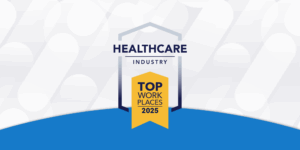Medication decision support helps identify potentially inappropriate medication
MOORESTOWN, N.J., Aug. 16, 2022 – A new peer-reviewed study from Tabula Rasa HealthCare, Inc.®, MedWise® Science, can help prescribers identify and reduce the levels of potentially inappropriate medications among older adults, reducing the risk of negative cognitive and physical outcomes.
The study, published in the Journal of the American Geriatrics Society, explored the dosage levels of urinary antimuscarinic medications with high anticholinergic properties. These drugs, which are often prescribed to older adults with urinary incontinence, are associated with negative cognitive and physical outcomes, such as delirium, dementia, and falls.
Researchers analyzed data from pharmacists who used TRHC’s novel medication decision support tool, MedWise® Science, to identify participants in Program of All-Inclusive Care for the Elderly (PACE) programs taking potentially inappropriate doses of urinary antimuscarinic medications and recommended interventions to prescribers. MedWise Science uses the active ingredients from a participant’s complete medication list, including over-the-counter drugs, to identify the risk of simultaneous, accumulative, multi-drug interactions, and predict the possibility of medication problems.
The research involved participants from 35 PACE organizations that use TRHC’s comprehensive CareKinesis® PACE Pharmacy and medication risk mitigation services. TRHC offers comprehensive clinical pharmacy services for PACE organizations that provide ongoing medication assessments, comprehensive safety reviews, medication risk mitigation interventions, pharmacogenomic application, 24/7 medication management support, and adherence packaging, among other benefits.
“We take very seriously our commitment to improve outcomes for vulnerable individuals with overlapping chronic conditions and complex medication lists,” said TRHC Chairman and CEO Calvin H. Knowlton, PhD. “We are pleased to see more evidence that our MedWise Science helps pharmacists optimize medications and prevent multi-drug interactions to promote better patient outcomes.”
The pharmacist MedWise-informed recommendations included reducing or eliminating specific urinary antimuscarinic drugs; resolving high anticholinergic burden that impact non-favorable outcomes in these patients; changing these drugs to more appropriate medications; or offering a combination of recommendations that provided prescribers with multiple options.
The study found that the pharmacists’ recommendations were accepted by PACE prescribers for 63% of participants. Among this group of participants, the overall standard daily dosage of urinary antimuscarinic medications decreased 65%, helping to mitigate the risk of negative cognitive and physical outcomes.
“The study serves as a proof of concept that, with the help of medication decision support tools, pharmacists can target specific medications to successfully decrease overall anticholinergic burden among medically complex older adults,” said Jacques Turgeon, BPharm, PhD, TRHC Chief Scientific Officer and CEO of Precision Pharmacotherapy Research and Development Institute. “The research indicates that such targeting could help reduce potential risks posed by high anticholinergic intake. Additional research could determine the impact of the pharmacist recommendations on cognitive and physical outcomes.”



